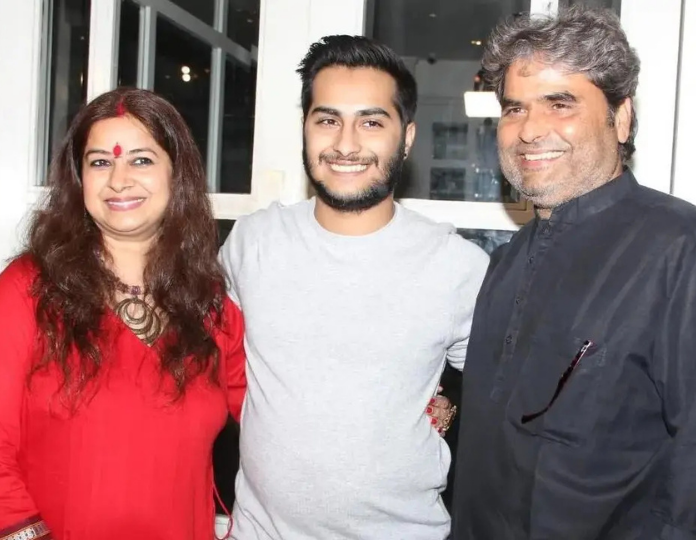Rekha Bhardwaj is known for her voice with a natural melancholic tone as well as a distinct earthy touch. Her soulful Sufiyana quality has lent a special touch to her songs. Some of her most notable songs include “Namak Ishq Ka,” “Sasural Genda Phool,” “Badi Dheere Jali,” “Darling,” “Kabira,” “Ghaghra,” “Hamri Atariya Pe,” and many more.
Early Life
Rekha Bhardwaj, born on January 24, 1964, in Delhi. She grew up in a musically inclined family and received her initial training from her elder sister. Rekha took formal music training at Gandharva Mahavidyalaya, Delhi. She was mentored by Shri Vasant Thakar, Pandit Vinay Chandra Mudgal, and Shri Madhup Mudgal Ji.
In November 1982, she began learning music from Guru Pandit Amarnath, “Shagird” of Ustad Amir Khan Sahab of the Indore Gharana. She terms Pandit Amarnath her “eternal guru.” After his demise in 1996, she continued her musical journey under his disciple, Shushri Amarjeet Kaur.
Rekha married acclaimed filmmaker and music composer Vishal Bhardwaj in 1991. She met Vishal in 1984 while preparing for the annual function of Hindu College in New Delhi. He was her junior there. In an interview, Rekha shared about their relationship, saying, “What brought us together was music. And the fact that we were in the same college… What also kept us close was the crazy streak we both had, perhaps still have.” Vishal and Rekha are the parents of budding filmmaker Aasmaan Bhardwaj.
Rekha Bharadwaj – The Voice Like No Other

Rekha Bhardwaj’s journey to fame was not without its challenges. She made her debut as a playback singer with the song ‘Ek Woh Din Bhi’ from the film “Chachi 420” in 1997, followed by Raja Ki Kahani in Godmother (1999), Yeh Kaisi Chaap Qadmon Ki in Jahan Tum Le Chalo (1999), and Makdee in Makdee (2002). Rekha gained prominence with “Rone Do” and “Chingari in “Maqbool (2003),” as well as “Lakad Jal Koyla Bhai” and the peppy “Namak Ishq Ka” in “Omkara” (2006).
It was also the time when her first album, “Ishqa Ishqa,” released in 2002, ten years after its conception. The album has songs like “Jogiya,” “Chingari,” “Raat Ki Jogan,” “Roshni,” “Tere Ishq Mein,” and “Ishqa Ishqa,” all penned by Gulzar Saab, under the music direction of Vishal Bharadwaj.
Famous Songs
Rekha’s collaboration with husband Vishal gave us many gems over the years. Their collaboration for “Darling (7 Khoon Maaf),” earned her Filmfare Best Playback Singer Award. She won the National Award for Best Female Playback Singer for the song ‘Badi Dheere Jali’ from the film “Ishqiya” (2011). Some of their famous somgs include “Phoonk De (No Smoking),” “Beedo” and “Ranaji” in Gulaal, “Raat Ke Dhai Baje (Kaminey),” “Oye Boy Charlie (Matru Ki Bijlee Ka Mandola),” “Hamri Atariya Pe” and “Jagaave Saari Raina” in Dedh Ishqiya, “Aaj Ke Naam (Haider),” “Tap Tap Gol Gol Tippe Mein Jo Doobe” and “Yeh Ishq Hai” in Rangoon, Ek Tero Balma Re Ek Mero Balma (Pataakha),”Dum Ghutta Hai (Drishyam),” “Chhoo Bhi Lo Woh Zinda Hai (Talvar),” “Sonchiraiya (Sonchiriya),” among others.
One of her most famous songs “Sasural Genda Phool,” came under AR Rahman. The song from Delhi-6, won her Filmfare Best Playback Singer Award. She also sang “Ranjha Ranjha (Raavan),” for Rahman.
The album’s success brought her further recognition and paved the way for her career-defining songs like “Ummeed (Fraaq),” “Saaye Saaye ( I Am),” “Phir Le Aaya Dil (Barfi),” “Re Kabira Maan Ja,” and “Ghaghra,” in Yeh Jawaani Hai Deewani, “Chadariya Jhini Re Jhini (Badlapur),” “Zindagi Kuchh Toh Bata (Bajrangi Bhaijaan),” “Teri Fariyad (Tum Bin 2), “Ban Titli (Manto),” and many more.


Other Work
Rekha has explored her artistic versatility with albums like Humm – Towards Nirvana (2010), Jiya Lage Na (2011), Irshaad (2011), Sarhadein (2011), Sakhi Saiyaan (2014), Moonlight Whispers (2015), Hui Mae Tumhari (2019), Manwa Mora (2021), and Rangrasiya (2024), showcasing her prowess in diverse genres. One of her most beautiful singles, was “Dhoop Aane Do,” written Gulzar. The song released under the independent music label, VB Music. Her ability to infuse emotion into every note has earned her critical acclaim and a devoted fan base.
Rekha Bhardwaj on IMDB














Leave feedback about this